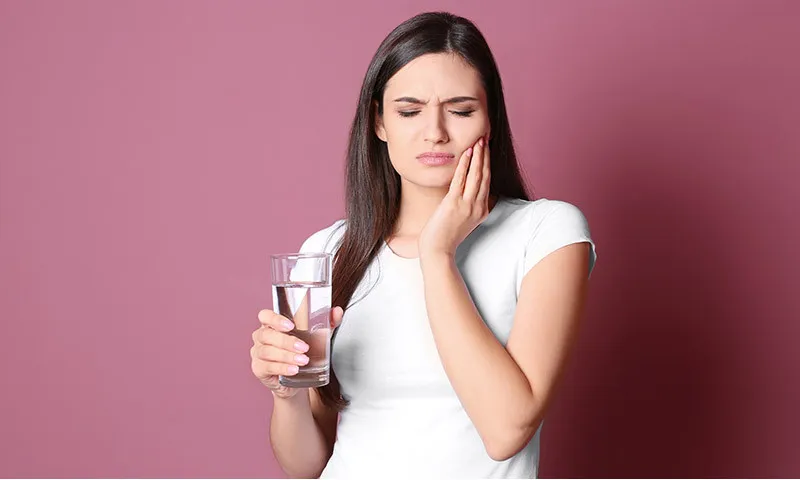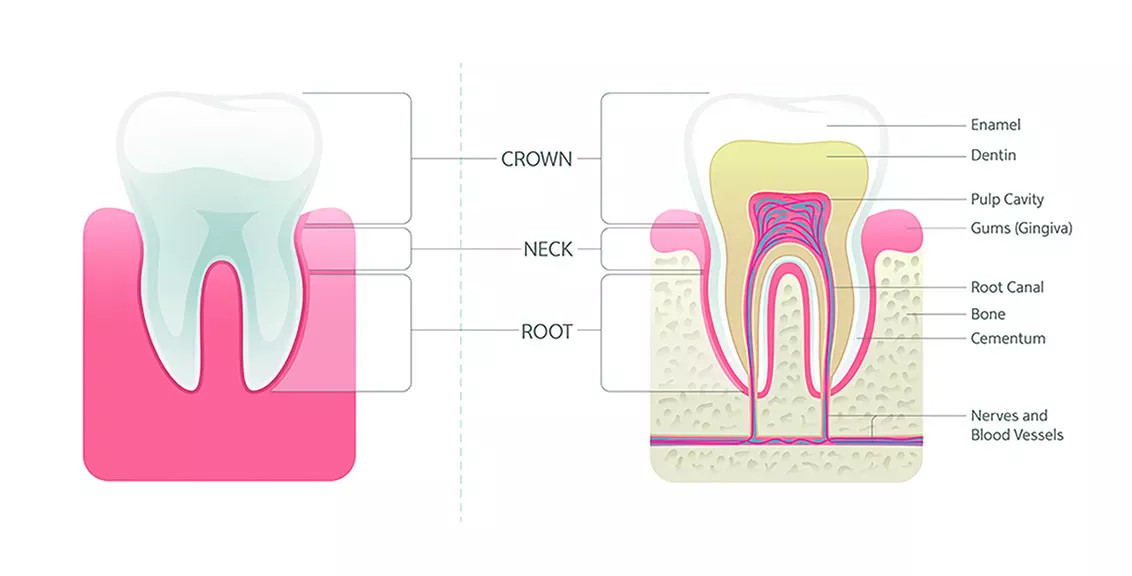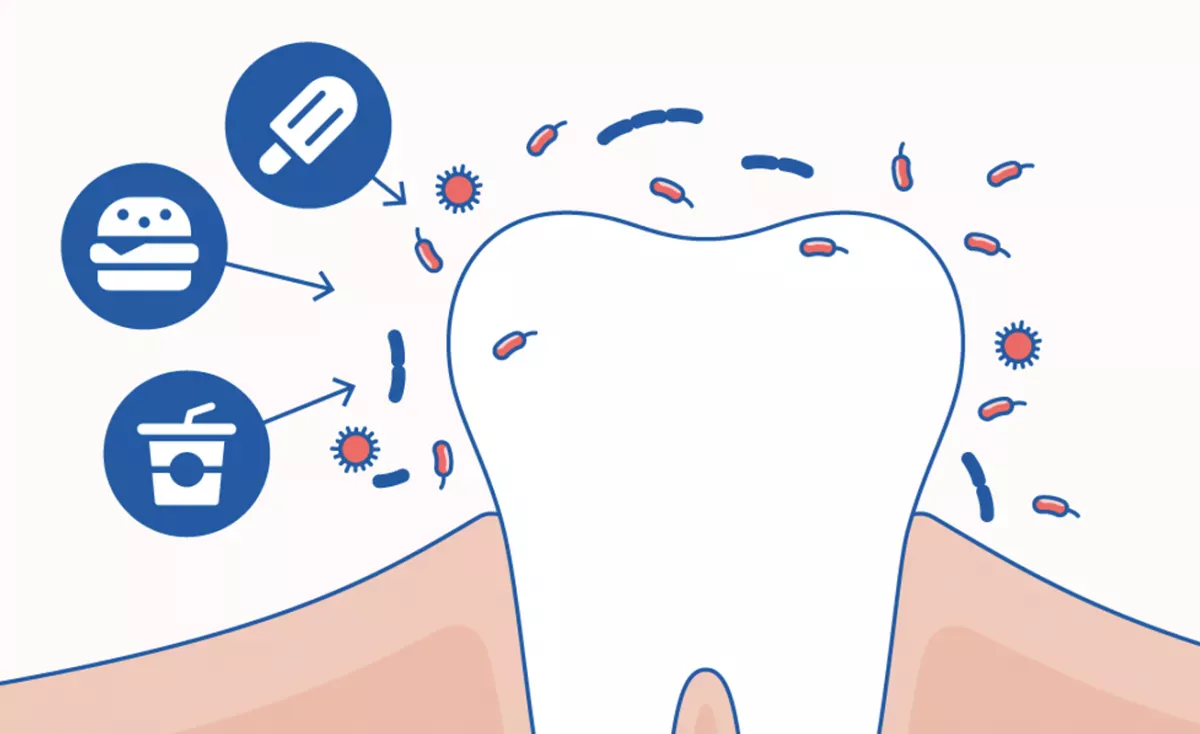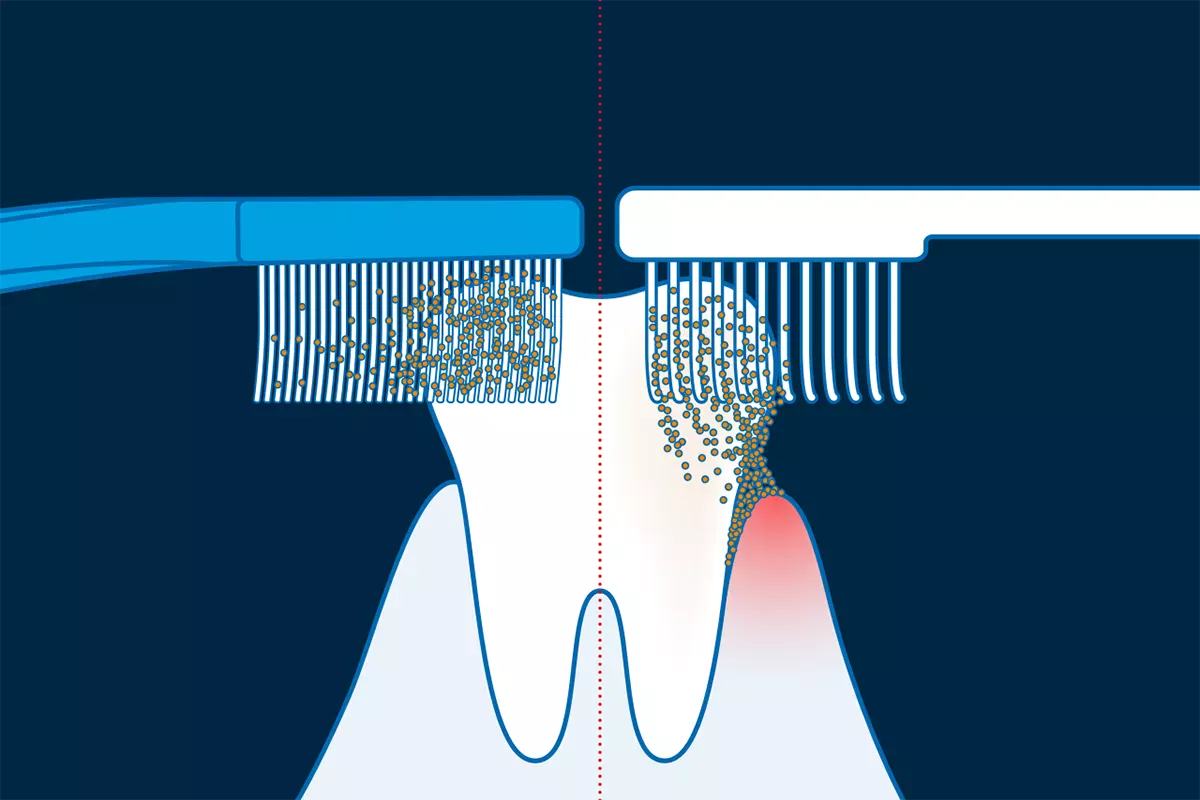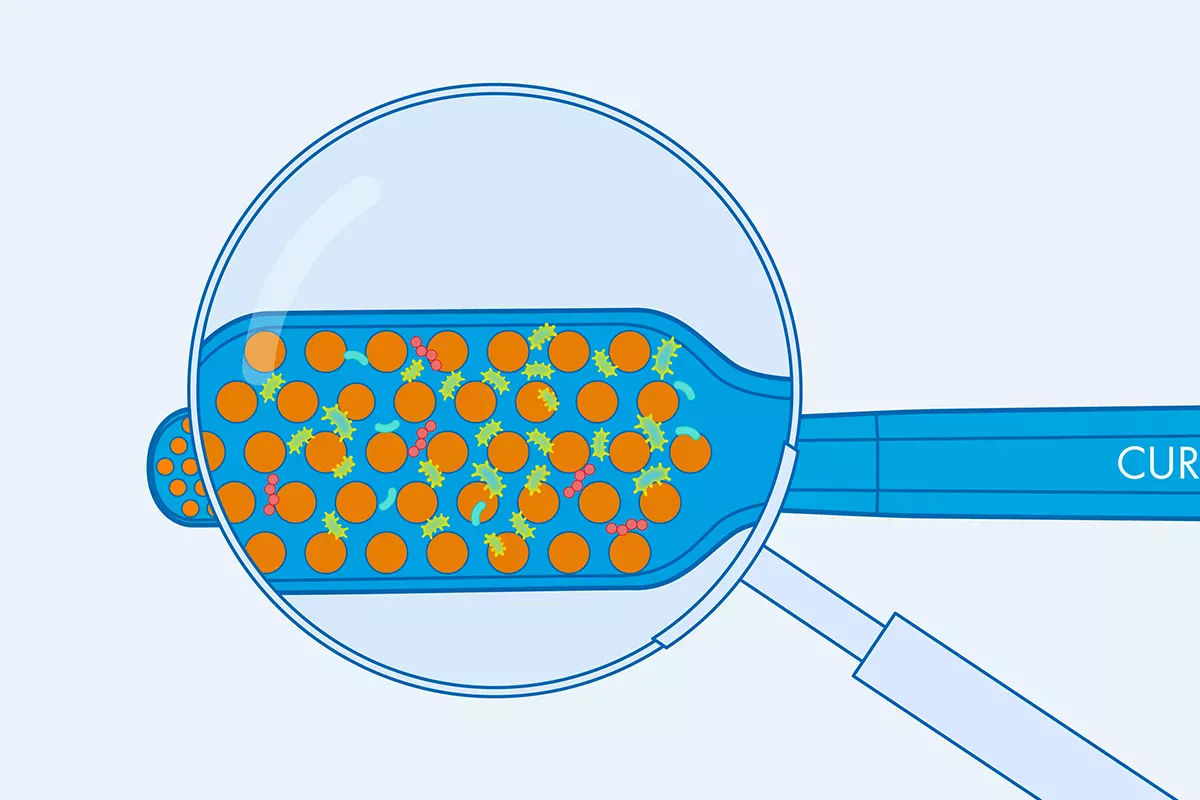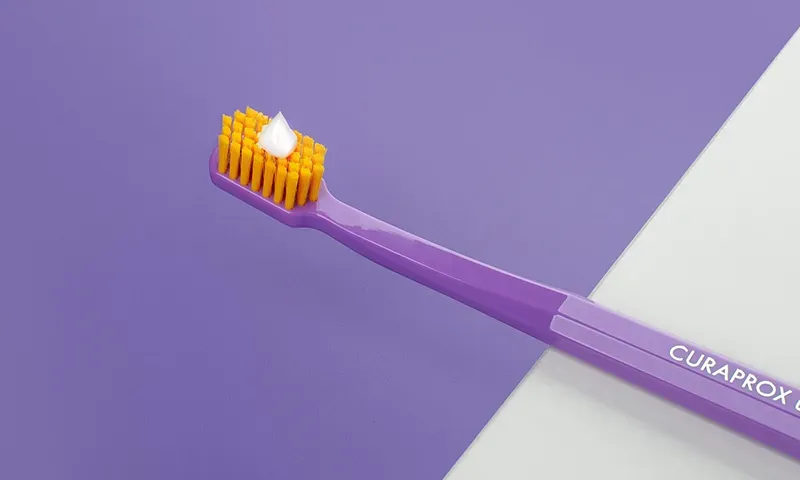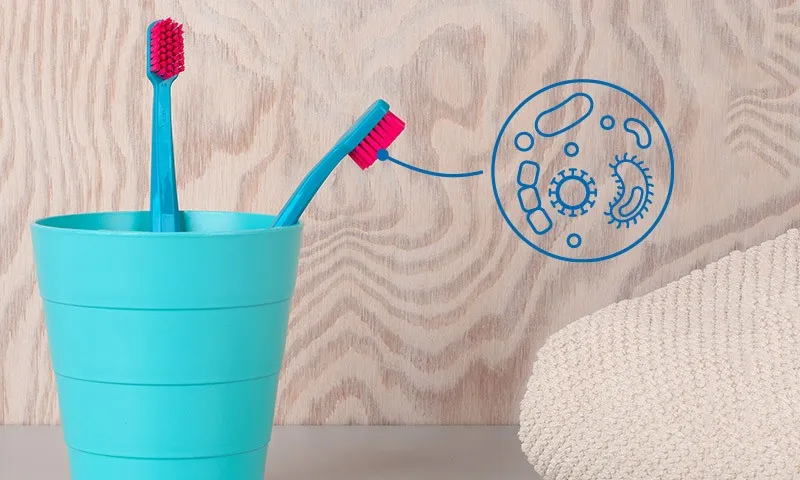What is meant by pain-sensitive teeth?
Pain-sensitive teeth are widespread: Depending on the source, about a quarter to more than half of the population suffers from sensitive teeth and reacts to certain stimuli with flashes of stabbing pain. Teeth hurt particularly often when eating very cold or hot foods and drinks. But sweet, sour and salty things can also cause a pulling pain - as can cold air or touch. The pain goes away quite quickly, but it does leave a proverbial bitter aftertaste. But what exactly do we mean by pain-sensitive teeth?
To do this, we first need to look at the anatomy of the tooth: Underneath the outer hard layer of the tooth, the enamel, lies a softer layer called the dentin - also known as the dentine. This part extends from the root to the crown and gives the tooth its colour and shape. In addition, microscopic tubules and nerve branches run through the dentin and lead to the pulp, a cavity in the centre of the tooth where the tooth nerves are located. Normally, the dentin in the crown of the tooth is covered with a thick layer of enamel and at the root of the tooth it is coated with gum so that it is well protected.
Pain-sensitive teeth occur when the dentin is exposed in places and nerve endings are exposed because either the gums have receded or there are gaps in the enamel. When the gums recede, the necks of the teeth are exposed. Since they are not covered with a thick layer of enamel, unlike the tooth crown, temperature fluctuations and chemical stimuli are transmitted directly to the tooth nerve.
Causes: Why are my teeth sensitive to pain?
So receding gums and damage to enamel are the most common causes of pain-sensitive teeth. But why do the gums recede and how do holes in the enamel develop?
Gum inflammation and periodontitis
If we do not brush our teeth regularly and thoroughly, plaque forms on them, which hardens into tartar over time - especially in hard-to-reach places such as the spaces between the teeth or at the gumline. There, bacteria spread undisturbed and attack the gums. This in turn reacts as an immune defence with an inflammation - this is called gingivitis or inflammation of the gums. If the inflammation remains permanent and the bacteria are not brushed away, the gums can detach from the necks of the teeth and recede. The gum inflammation then develops into periodontitis and can also affect the jaw bones. People who suffer from periodontitis usually have exposed, pain-sensitive tooth necks.
Gum inflammation can always increase when the hormonal balance is upside down - for example during and after pregnancy, during breastfeeding, before menstruation and during the menopause. Painful teeth can then be the result. Stress can also promote gingivitis.
Good to know:
Read our article to find out what you can do to prevent gingivitis from developing into periodontitis:
Incorrect dental care
When it comes to dental care, you can make two mistakes, both of which can cause painful teeth: Either you brush your teeth too infrequently and not thoroughly enough, allowing bacteria to spread freely - which can eventually lead to gingivitis, periodontitis or tooth decay. Or you brush too intensively and with too much force.
If you scrub back and forth roughly, with a lot of pressure and a toothbrush that is too hard on the front surfaces of the teeth, you run the risk of damaging the gums - this can happen both with a manual toothbrush or with an electric toothbrush without pressure control. The result: the gums retract, the necks of the teeth are exposed and, because they are no longer protected by enamel, the teeth are sensitive to pain.
The wrong toothpaste can also be responsible: If you use an aggressive whitening toothpaste that literally abrades the enamel, the dentin can also be exposed.
Acidic diet
Not only mechanical action is dangerous for tooth enamel: Acidic foods and drinks such as soft drinks, energy drinks, fruit juices and alcoholic beverages also attack the enamel - and can even dissolve it over time.
Alcohol also has a vasodilatory effect and can irritate the dental nerve. This is why many people complain of painful teeth after drinking alcohol - especially if it lasts longer. This is mainly due to the fact that already existing damage to the tooth enamel, teeth affected by caries or open tooth necks then hurt more than usual.
Besides acidic drinks, other forms of acids are also possible causes of pain-sensitive teeth. For example, people suffering from bulimia or reflux, as well as pregnant women who frequently vomit, also often suffer from pain-sensitive teeth.
Dental treatments
Dental treatments can also cause painful teeth - but usually only temporarily.
This can happen especially after the following treatments:
- Preparation and insertion of crowns, fillings, bridges, inlays or veneers
- Professional teeth cleaning
- Bleaching (teeth whitening)
- Periodontal treatment
- Caries removal
- Wisdom tooth surgery
Increased sensitivity is very common, especially with bleaching. About 80 percent of patients temporarily complain of painful teeth. This is due to the fact that hydrogen peroxide is used in bleaching, which temporarily dries out the enamel and also irritates the gums. Especially people who already have exposed tooth necks or damage to the tooth enamel should think twice before having their teeth bleached. This can make the teeth even more sensitive to pain. Ask your dentist for advice.
Teeth grinding
When people grind their teeth, extreme forces act on the tooth enamel that are significantly higher than during normal chewing. Particularly during sleep, sufferers press their teeth together with great force and rub them against each other. This pressure then causes damage to the enamel, which in turn can be a cause of pain-sensitive teeth.
Affected people are usually not even aware that they grind their teeth. Most people are made aware of the nocturnal noise by their partner. To prevent further damage to the tooth enamel, teeth grinders often wear a bite splint that interrupts the direct contact of the teeth.
Good to know:
Find out what you can do about teeth grinding in our article:
Smoking
Tobacco does not directly make teeth more sensitive to pain, but it is indirectly responsible. Smokers suffer particularly often from diseases in the mouth and teeth area, because this area is less supplied with blood than non-smokers. This is why the typical sign of bleeding gums is often missing in gum inflammations. Inflammations are often overlooked for a long time and only recognised when they are already chronic or have developed into periodontitis. Many smokers therefore suffer from pain-sensitive teeth.
Chalk teeth
In people with chalk teeth the enamel is much softer than usual. Gaps often develop, exposing the dentin, which is why those affected suffer from pain-sensitive teeth for life and have to have their teeth sealed regularly.
Cold
If your teeth in the upper jaw start to hurt while you have a cold, you can breathe a sigh of relief. The reason is most likely simply an inflammation of the maxillary sinus, which is part of the sinus and has been taken over by the pathogens and is now pressing on the nerve endings of the teeth. As a rule, only the teeth in the upper jaw hurt. However, if the inflammation is particularly severe, the lower jaw can also be affected. As soon as the cold has subsided, the aching teeth should also be a thing of the past.
Medicines
Pain-sensitive teeth can also occur as a side effect of taking certain medicines. For example, some people report in forum posts that they have been suffering from very pain-sensitive teeth since taking Cortisone .
In general, the following medicines can have a negative effect on dental health:
- Cortisone
- Antidepressants
- Blood thinner
- Anti-epileptic drugs
- Chemotherapy
What if only a single tooth is sensitive to pain?
If only one tooth is affected, there may be a serious dental problem. Therefore, you should definitely have it examined by a dentist. The following diseases are possible:
Caries
Caries occurs when caries bacteria multiply in the plaque and convert sugar into acid on the tooth surface. The acid then attacks the tooth enamel and over time it dissolves in places, allowing the bacteria to penetrate into the interior of the tooth. This exposes the dentin. As soon as the dentist has removed the caries and treated it with a filling or crown, the pain should disappear.
Caries: Treatment and prevention
Crack or fissure in the tooth
If you have a crack or fissure in your tooth, you will notice it mainly by a strong pain when you bite down. As soon as you open your mouth again and the pressure from the tooth disappears, the pain will also decrease. Cracks or fissures are usually not visible to the naked eye.
Abscess
An abscess occurs when the centre of the tooth, the pulp, becomes inflamed with its nerves and blood vessels. The main symptom is a pus-filled swelling at the root tip of the tooth, often accompanied by persistent pain and facial swelling. Root canal treatment is necessary for treatment.
Good to know:
Read our article to find out why you should never take an abscess lightly:
Treatment: What to do for pain-sensitive teeth?
Temporarily, the stinging or pulling pain can be avoided by avoiding particularly cold, hot, sweet or sour foods and drinks. However, you probably don't want to live permanently without a refreshing ice cream in summer, a nice hot cup of tea in winter and a sweet treat now and then. In the following sections, you will learn what you can do yourself against pain-sensitive teeth and when it is time to go to the dentist.
When to go to the dentist for pain-sensitive teeth?
You may have been wondering for a while whether you should put up with pain sensitivity or whether you should get your teeth checked. Painful teeth can definitely be a warning sign of a disease such as periodontitis or tooth decay. Therefore, you should make an appointment with your dentist as soon as possible to have your teeth examined. Only an expert can ultimately diagnose exactly why your teeth are suddenly sensitive and prescribe appropriate measures to treat not only the symptoms but also the underlying cause. The longer you put off the appointment, the more expensive it may be to treat the cause.
If the following symptoms occur together with the increased sensitivity to pain, you should make an appointment directly:
- Frequent bleeding gums
- Visible gum recession
- Loose teeth
- Bad breath
Sealing at the dentist
To make your teeth less sensitive, the dentist can seal open tooth necks or damage to the enamel with a special fluoride varnish or also close dentin tubules - the small nerve tubules in the dentin that are responsible for transmitting the stimulus to the tooth nerve - with a plastic. This stops the transmission of the stimulus and the pain no longer occurs. Sealants usually last for several months.
What you can do yourself against pain-sensitive teeth
Unfortunately, there is no "cure-all" or "instant remedy" for painful teeth. Instead, dental care is crucial. If you choose the right brushing tool and know how to clean your teeth gently and thoroughly, your teeth can soon be much less sensitive to pain.
The right toothbrush
If you think that you can brush your teeth more thoroughly with a hard or medium-hard toothbrush, you are unfortunately wrong. On the one hand, this is dangerous because you can damage your gums. But it is also less thorough. Hard bristles are not flexible enough to remove plaque from the entire surface of your teeth - it's like trying to sweep up spilled flour on the kitchen floor with a rake. A soft toothbrush has a much denser brush head and correspondingly more flexible bristles that adapt well to the structure of the tooth surface and can remove plaque thoroughly. In general, the more bristles there are on a toothbrush, the softer and more pliable they need to be.
Good to know:
The super soft toothbrush CS 12460 Velvet by Curaprox has 12'460 velvety soft bristles that adapt to the tooth surface without irritating your gums. For comparison: a conventional toothbrush usually has about 500 bristles.
The right toothpaste
Whether your pain-sensitive teeth get worse or better can also depend a lot on your toothpaste. Two factors are important here: How high is the abrasion factor? And do they contain ingredients that reduce pain sensitivity? If you have pain-sensitive teeth, you should definitely stay away from aggressive whitening toothpastes, which often contain coarse abrasives that further grind down the enamel - and make your teeth even more pain-sensitive.
The value that tells you how much your toothpaste is attacking your enamel is called the RDA value and stands for Relative Dentin Abrasion. The higher the value, the greater the abrasive effect. People with pain-sensitive teeth should ideally choose a toothpaste with an RDA value below 70. These toothpastes contain only fine particles and clean in a particularly gentle way. They are often labelled "sensitive". Most conventional toothpastes have an RDA value between 70 and 100 and are also safe for healthy teeth. Above 100, toothpastes are considered highly abrasive and are not recommended for daily use. Aggressive whitening toothpastes, however, can even crack the 200 mark.
A particularly important ingredient in the fight against pain-sensitive teeth is hydroxyapatite - a natural mineral that makes up 95 percent of tooth enamel. Toothpastes with hydroxyapatite can - with regular use - rebuild the enamel and repair or seal small defects on the tooth surface. Toothpastes with hydroxyapatite also reduce the pain sensitivity of exposed tooth necks.
Good to know:
The toothpastes from the 'Be you' range by Curaprox not only clean your teeth particularly gently with an RDA value of 30 to 60, but also build up the tooth enamel with hydroxylapatite. Bonus: A natural enzyme provides a gentle whitening effect without attacking your teeth.
Fluoride: Yes or no?
Although there are always rumours, especially on the internet, that toothpaste with fluoride is harmful, experts agree across the board: dentists, scientists and government institutions all recommend the use of toothpastes with fluoride, as they have been proven to protect against caries. This is especially important in cases of exposed tooth necks and damage to the tooth enamel, because there is an increased risk of tooth decay here. If you still want to use a toothpaste without fluoride, make sure it contains hydroxyapatite to strengthen the enamel.
In our article on toothpaste with fluoride, we take a closer look at the rumours circulating, clarify possible side effects and give an overview of the correct dosage for children and adults:
Toothpaste with fluoride: Is it harmful?
The right toothbrushing technique
When brushing their teeth, many people make the mistake of gripping their toothbrush tightly in their fist and scrubbing back and forth in a line as hard as they can. In fact, neither teeth nor gums like this. With a gentle but thorough brushing technique, you can remove plaque much better.
Here is an overview of the most important information:
- Place the toothbrush at a 45 degree angle so that it is half on the teeth and half on the gums, pointing towards the gums (slanting downwards in the lower jaw and upwards in the upper jaw).
- Brush in small, circular movements with little pressure, always from one side to the other.
- Always brush the hard-to-reach areas like the inside of the teeth and behind the molars first so you don't forget them.
- Brush your teeth twice a day for about three minutes; you'll know you've brushed enough when your teeth feel smooth when you run your tongue over them.
If you find it difficult to make gentle, circular movements with a manual toothbrush, an electric toothbrush like the Curaprox Hydrosonic with 'Sensitive' brush head could be a good choice. It does the gentle circular motion so you can't accidentally hurt your gums.
Good to know:
You can find detailed step-by-step instructions for the - scientifically proven - best technique with pictures and helpful background information in our instructions:
Fluoride gel
Dentists often recommend the use of a fluoride-containing gel for pain-sensitive teeth, which is available at the pharmacy or directly from the dentist and is applied once a week. The fluoride hardens the tooth enamel and protects exposed tooth necks from decay. It is best to ask your dentist for advice on this.
Mouthwash
There are also mouthwashes specially designed for people with pain-sensitive teeth to reduce pain sensitivity. However, we do not recommend using mouthwashes on a regular basis as they unbalance the oral flora. Mouthwashes such as Curaprox's Perio plus range should only be used as directed by the dentist and only for a limited time to treat bacterial infections. The gold standard for antibacterial mouthwashes, which can be used before and after surgery or for gum infections, for example, is the active ingredient chlorhexidine. Ask your dentist for advice on whether it makes sense to use a mouthwash in your case.
Gum massage
A "home remedy" for pain-sensitive teeth is a daily gum massage. To strengthen blood circulation and prevent further gum recession, you can massage your gums twice a day. To do this, simply move a finger from the inside to the outside in a circular motion with little pressure.
Globules
If you want to treat your pain-sensitive teeth homeopathically, you can try Aconitum globules. The remedy is supposed to help against teeth that are sensitive to cold. Note, however, that the effectiveness of homeopathy has not yet been scientifically proven.
Five tips: How to prevent pain-sensitive teeth
As you already know, acidic foods and bacteria attack your tooth enamel. We've put together five tips that will significantly reduce the negative effects:
1. Wait 30 minutes after eating
"Don't forget to brush your teeth after eating" - you probably remember this saying from your kindergarten or primary school days. However, there is a small caveat here: especially if you have eaten something sour or sweet, you should wait 30 minutes before brushing because the acid attack softens your tooth enamel and you run the risk of wearing it down even more. Within the half-hour wait, your enamel will have remineralised and you can pick up your toothbrush with confidence.
2. Do without snacks
Your teeth will be happy if they are attacked by acid as rarely as possible. If you constantly snack between meals or drink cola drinks, orange juice or energy drinks for a longer period of time, you are not doing your tooth enamel any favours. It is better to consciously treat yourself to something sweet after a main meal and to drink sweet drinks relatively quickly. This way, your enamel only has to remineralise once and is not constantly under attack.
3. Acid attenuate
With acidic fruits such as kiwis, currants, etc., you can reduce the acidity by eating the fruits together with natural yoghurt. With sugary and acidic drinks, you can reduce the negative effect by rinsing your mouth with water afterwards.
4. Change toothbrush regularly
Over time, bacteria build up on your toothbrush and can cause dental diseases. Therefore, you should change your toothbrush every two to three months to avoid infecting your mouth even when brushing your teeth.
5. Use interdental brush
Interdental spaces are the ideal breeding ground for bacteria. Since conventional toothbrushes cannot reach the hidden places between the teeth, bacteria feel particularly comfortable here and can multiply undisturbed - and ultimately attack tooth enamel and gums. To effectively combat the troublemakers, you need toothbrushing tools that are specially designed for these hard-to-reach places: Interdental brushes.
In our article, we tell you exactly how and why you should brush your teeth daily with interdental brushes:
Instructions: Clean interdental spaces properly
Sources
Active with MS: Dental problems after cortisone treatment.
Frankenberger, Angelika: How alcohol damages teeth: What you can do, on: jameda.de.
Globuli.de: Globuli for toothache and inflammation of the tooth root.
Hennessen, Gisbert et al.: Sensible Zahnhälse und Zahnhalsdefekte, on: apotheken.de.
Kassenzahnärztliche Vereinigung Nordrhein: Hypersensitive teeth.
Kreuzapotheke Treia: Pain-sensitive teeth - Know the cause & treat.
Mainzahn - Zentrum für Zahngesundheit: Dental problems caused by medication - Is there a connection?
Praxis für Zahnmedizin DS Peter Schmidt: Toothache with colds - causes and relief.
Rutkowski, Hanna: Pain-sensitive teeth, on: netdoktor.de.
 Swiss premium oral care
Swiss premium oral care
